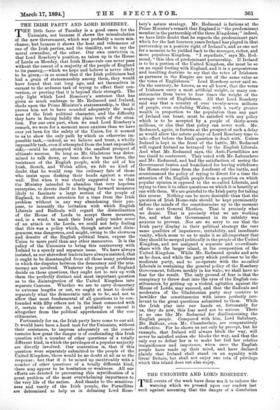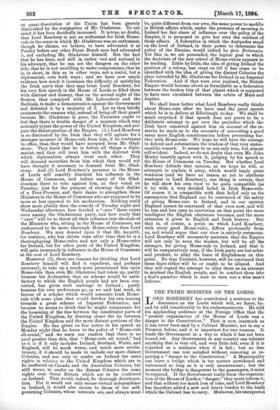THE UNIONISTS AND LORD ROSEBERY. T HE events of the week
have done mush to enforce the warning which we pressed upon our readers last week against assuming that the danger of a dissolution or quasi-dissolution of the Union has been gravely diminished by the resignation of Mr. Gladstone. To our mind it has been decidedly increased. It is true, no doubt, that Lord Rosebery is not an enthusiast for Irish Home- rule in the sense in which Mr. Gladstone was an enthusiast, though he claims, we believe, to have advocated it at Paisley before any other Front Bench man had advocated it, not excluding Mr. Gladstone himself. But the fact that he has been, and still is, rather cool and rational in his advocacy, that he can see the dangers on the other side, that he is not unwilling to make compromises, that he is, in short, in this as in other ways, not a zealot, but a diplomatist, cuts both ways ; and we have now ample evidence how much it increases the difficulty of satisfying the Irish party that they may trust Lord Rosebery, for his very first speech in the House of Lords so filled them with distrust and dismay, that on the second night of the Session they conspired with Mr. Labouchere and the Radicals, to make a demonstration against the Government and defeated it by a majority of 2. Let us then briefly enumerate the reasons why, instead of being off their guard because Mr. Gladstone is gone, the Unionists ought to feel that there is double danger of a measure which may seriously injure the power of the United Kingdom, and pre- pare the disintegration of the Empire. (1.) Lord Rosebery is so distrusted by the Irish that they will agitate for a stronger measure of Home-rule from him, if he continues in office, than they would have accepted from Mr. Glad- stone. They know that he is before all things a diplo- matist, and they will treat him with the distrust with which diplomatists always treat each other. They will demand securities from him which they would not have thought it necessary to demand from Mr. Glad- stone. And (2) Lord Rosebery's presence in the House of Lords will sensibly diminish his influence in the House of Commons, and induce many of the Glad- stonians there to vote against him, as they voted on Tuesday, just for the purpose of showing their dislike of a Peer-Premier, and their desire to strengthen those Ministers in the House of Commons who are supposed to be more or less opposed to his moderation. Nothing could show more plainly than the comedy of Tuesday night and Wednesday afternoon how decided a " cave " there exists even among the Gladatonian party, and how ready that " cave " will lad to throw all their influence into the scale of the Ministers who, sitting in the House of Commons, are understood to be more thorough Home-rulers than Lord Rosebery. We may depend upon it that Mr. Asquith, for instance, who has shown time after time that he is a thoroughgoing Home-ruler, and not only a Home-ruler for Ireland, but for other parts of the United Kingdom, will gain immensely in influence in the House of Commons at the cost of Lord Rosebery. Moreover (3), there are reasons for thinking that Lord Rosebery himself will find it expedient, and perhaps necessary, to take up a much more pronounced line upon Home-rule than even Mr. Gladstone had taken up, partly because his declaration that no scheme would be satis- factory to which the English people had not been con- verted, has given such umbrage to Ireland ; partly because his own preferences go, as we said last week, in favour of a scheme which would associate Irish Home- rule with some plan that would further his own leaning towards a great, scheme of Imperial Federation, and because he seems to think that he might compensate for the loosening of the ties between the constituent parts of the United Kingdom, by drawing closer the tie between the United Kingdom and the more distant portions of the Empire. He has given us fair notice in his speech on Monday night that he leans to the policy of " Home-rule all-round," and we warn our readers that there is no peril greater than this, that " Home-rule all round," bad as it is if it only includes Ireland, Scotland, Wales, and England, will be much worse, and much more revolu- tionary, if it should be made to include our more distant Colonies, and not only to confer on Ireland the same rights in relation to the United Kingdom which axe to be conferred on Canada and the Australian Colonies, but still worse, to confer on the distant Colonies the same rights over Great Britain which are to be conferred on Ireland. i That would, indeed, be thorough disintegra- tion. For t would not only secure virtual independence to Ireland, it would also secure to those of our self- governing Colonies, 'whose interests are, and always must be, quite different from our own, the same power to meddle in British affairs which, under the pretence of securing to Ireland her fair share of influence over the policy of the Empire, it is proposed to give her over the conduct of those affairs. A federation in which the Antipodes stood on the level of Ireland, in their power to determine the policy of the Empire, would indeed be finis Britannia. Yet this is, we are persuaded, the logical goal to which the doctrines of the new school of Home-rulers appears to be tending. Little by little, the idea of giving Ireland the position of a colony, has crept on till it has come to be identified with the idea of giving the distant Colonies the place intended by Mr. Gladstone for Ireland in an Imperial Federation. And if that were ever realised, the British Empire would become about as formidable as a federation between the broken bits of that planet which is supposed to have once circulated between the orbits of Mars and Jupiter.
We shall know better what Lord Rosebery really thinks about Home-rule after we have read the great speech which he is to deliver at Edinburgh to-day. We shall be much surprised if that speech does not prove to be a deliberate attempt to get over the prejudice which the Irish have conceived against him on account of the re- marks he made as to the necessity of converting a good many more English constituencies before proceeding fur- ther with Home-rule. We hope he will have the courage to defend and substantiate the wisdom of that very states- manlike remark. It seems to us not only true, but almost self-evident. Indeed, we do not doubt that even Mr. John Morley heartily agrees with it, judging by his speech in the House of Commons on Tuesday. But whether Lord Rosebery defends that opinion, as we hope he will, or attempts to explain it away, which would imply great weakness (and we have no reason as yet to attribute weakness to Lord Rosebery), one thing is certain, that he will show his own view to be quite compatible (as it is) with a very decided belief in Irish Home-rule. Of course it is compatible with that belief only on the assumption that England can be convinced of the safety of giving Home-rule to Ireland, and in our opinion England cannot be convinced of that even now, and will be less and less open to conviction on that point the more intelligent the English electorate becomes, and the more attention it gives to English and Irish history. But that is, of course, a point on which Lord Rosebery, with every good Home-ruler, differs profoundly from us, and would argue that our view is entirely erroneous. Lord Rosebery will necessarily maintain that the Empire will not only be none the weaker, but will be all the stronger, for giving Home-rule to Ireland, and that it will be comparatively easy, if the Irish party are but sober and prudent, to allay the fears of Englishmen on this point. No true Unionist, however, will be convinced that these fears either will be or ought to be allayed. And they will regard the attempt to allay them as an attempt to mislead the English people, and to conduct them into a fool's paradise which is sure to turn out a wise man's Inferno.



































 Previous page
Previous page